人教版英语八年级上册-unit9复习教案
人教版八年级英语上册Unit9单元教学设计

2.难点:
-语法难点:一般过去时的运用,特别是在句子中的变化和动词过去式的拼写。
-阅读难点:对文章深层含义的理解,如作者的观点、态度和隐含信息。
-口语难点:流畅地运用所学词汇和句型进行表达,克服紧张和恐惧心理。
-写作难点:构建合理的文章结构,使用恰当的连接词,使文章内容连贯。
(三)学生小组讨论
1.教师将学生分成小组,每组选择一个探险话题进行讨论。
-话题可以包括:著名探险家的故事、探险活动的意义、自己或他人的探险经历等。
2.小组内部分工合作,收集资料、整理观点、准备发言。
3.各小组代表进行汇报,分享本组的讨论成果。
(四)课堂练习
1.设计词汇填空、选择题、改错题等练习,巩固新学的词汇和语法知识。
-对学习困难的学生进行个别辅导,提供额外的支持和鼓励。
3.合作学习,促进交流:
-采用小组合作形式,鼓励学生互相帮助,共同完成学习任务。
-设计小组讨论和分享环节,提高学生的合作能力和口语表达能力。
4.精讲多练,巩固语法:
-通过例句和实际操作,详细讲解一般过去时的构成和用法。
-设计多样化的练习,让学生在实际运用中巩固语法知识。
-观看一部与探险相关的英文电影或纪录片,记录并学习其中的新词汇和表达。
-参加学校或社区组织的探险活动,亲身体验探险的乐趣,将经历与同学分享。
作业布置要求:
1.学生按时完成作业,保证作业质量。
2.家长监督孩子完成作业,关注学生的学习进度和需求。
3.教师及时批改作业,给予反馈和指导,帮助学生不断提高。
-学生跟读、模仿,确保正确掌握词汇的发音和意义。
3.语法讲解:
英语教案人教版八年级英语上册Unit 9 Can you come to my party
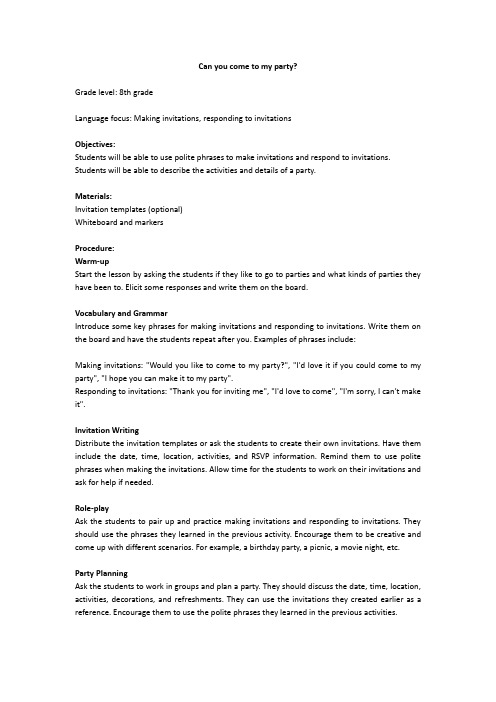
Can you come to my party?Grade level: 8th gradeLanguage focus: Making invitations, responding to invitationsObjectives:Students will be able to use polite phrases to make invitations and respond to invitations. Students will be able to describe the activities and details of a party.Materials:Invitation templates (optional)Whiteboard and markersProcedure:Warm-upStart the lesson by asking the students if they like to go to parties and what kinds of parties they have been to. Elicit some responses and write them on the board.Vocabulary and GrammarIntroduce some key phrases for making invitations and responding to invitations. Write them on the board and have the students repeat after you. Examples of phrases include:Making invitations: "Would you like to come to my party?", "I'd love it if you could come to my party", "I hope you can make it to my party".Responding to invitations: "Thank you for inviting me", "I'd love to come", "I'm sorry, I can't make it".Invitation WritingDistribute the invitation templates or ask the students to create their own invitations. Have them include the date, time, location, activities, and RSVP information. Remind them to use polite phrases when making the invitations. Allow time for the students to work on their invitations and ask for help if needed.Role-playAsk the students to pair up and practice making invitations and responding to invitations. They should use the phrases they learned in the previous activity. Encourage them to be creative and come up with different scenarios. For example, a birthday party, a picnic, a movie night, etc.Party PlanningAsk the students to work in groups and plan a party. They should discuss the date, time, location, activities, decorations, and refreshments. They can use the invitations they created earlier as a reference. Encourage them to use the polite phrases they learned in the previous activities.Party PresentationAsk each group to present their party plan to the class. They should describe the activities, the details of the party, and use the polite phrases they learned in the previous activities.Wrap-upReview the key vocabulary and grammar from the lesson. Ask the students to reflect on what they have learned and how they can use polite phrases to make invitations and respond to invitations in their daily life.Assessment:Observe the students during the role-play and party planning activities. Check that they are using the polite phrases correctly and that their party plans are well-organized and include all the necessary details. Provide feedback and corrections as needed.。
人教版八年级英语上册Unit9 Can you come to my party教案

Unit 9Can you come to my party?第一课时Section A (1a~1c)§自主学习案根据句意及首字母提示完成单词。
1.She didn't go to school and stayed in bed because she had the f lu.2.Can you come and h elp me with my English?3.Can I m eet my friend tomorrow, Mom?4.I must go to see a d octor because I feel ill.5.My mother prepares for b reakfast for our family every morning.§课堂导学案Step 1准备与热身(Preparation)Hello,class.We are learning Unit 9 today.But first look at this sentence:Can you come to my party? What does it mean?You are correct. It means “你能来参加我的聚会吗?”“Can” means “能,行”. You may answer like these: Yes,I can.I can come to the party./No. I can't.I have to do my homework. In these sentences both can and have to are model verbs. They are part of the predicates.Can you come to school? Yes, I can./No, I can't.I have to see a doctor.Can you get to school by bus? Yes, I can./No, I can't.I have to walk.Step 2呈现与输入(Presentation)Please look at the picture on page 65. The boy in the middle is going to hold a party.Can everyone come to the party?Help my parents, prepare for an exam, meet my friends,have the flu, go to the doctor.Please read these expressions loudly. And match the words with the picture.Areyou OK? Let's check the answers.Step 3练习与体验(Practice)You are great ! As you see, there are some people in the picture.Do you know who's who?Now please listen to the conversation.Pay attention to Sun Ning's words carefully.He says the names of each person he is inviting. When I play the recording for the first time,you just listen carefully. When I play the recording for the second time,please write the names of each person next to his or her picture. You have to complete the activity on your own.OK, let's go!Now let's talk as they do in the conversation.In other words, we are going to talk in imitation of the conversation we have just heard and read.Step 4运用与生成(Production)Now please make your own dialogues in groups of four. Suppose you are the students in the picture. One of you is inviting the other three students to his party. The other students are saying if he can go or not.If you can't go, remember to give a reason.When you practice, please pay attention to the pronunciation and intonation.I'll offer vocabulary and pronunciation support if you need.Step 5巩固与提高(Progress)【探究点】Can you come to my party on Saturday afternoon? 你能在周六下午来参加我的聚会吗?Can you…?句型是熟人和朋友之间常用的表达邀请或请求的用语。
【人教版】新目标八年级英语上册:Unit 9 单元教学设计
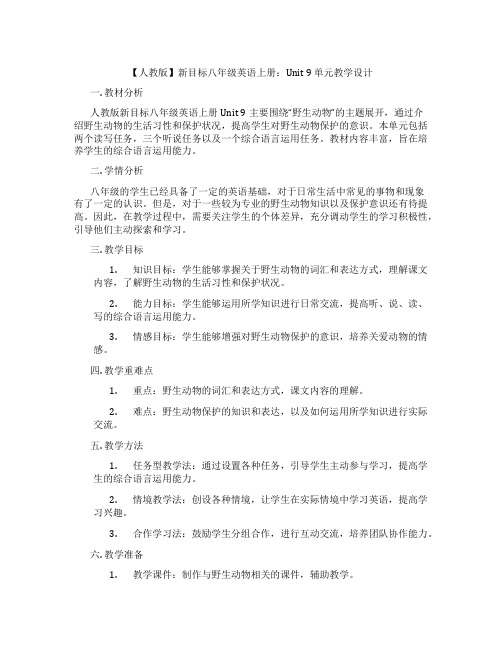
【人教版】新目标八年级英语上册:Unit 9 单元教学设计一. 教材分析人教版新目标八年级英语上册Unit 9主要围绕“野生动物”的主题展开,通过介绍野生动物的生活习性和保护状况,提高学生对野生动物保护的意识。
本单元包括两个读写任务,三个听说任务以及一个综合语言运用任务。
教材内容丰富,旨在培养学生的综合语言运用能力。
二. 学情分析八年级的学生已经具备了一定的英语基础,对于日常生活中常见的事物和现象有了一定的认识。
但是,对于一些较为专业的野生动物知识以及保护意识还有待提高。
因此,在教学过程中,需要关注学生的个体差异,充分调动学生的学习积极性,引导他们主动探索和学习。
三. 教学目标1.知识目标:学生能够掌握关于野生动物的词汇和表达方式,理解课文内容,了解野生动物的生活习性和保护状况。
2.能力目标:学生能够运用所学知识进行日常交流,提高听、说、读、写的综合语言运用能力。
3.情感目标:学生能够增强对野生动物保护的意识,培养关爱动物的情感。
四. 教学重难点1.重点:野生动物的词汇和表达方式,课文内容的理解。
2.难点:野生动物保护的知识和表达,以及如何运用所学知识进行实际交流。
五. 教学方法1.任务型教学法:通过设置各种任务,引导学生主动参与学习,提高学生的综合语言运用能力。
2.情境教学法:创设各种情境,让学生在实际情境中学习英语,提高学习兴趣。
3.合作学习法:鼓励学生分组合作,进行互动交流,培养团队协作能力。
六. 教学准备1.教学课件:制作与野生动物相关的课件,辅助教学。
2.教学素材:收集一些关于野生动物的图片、视频等素材,用于教学展示。
3.课堂活动准备:准备一些与野生动物保护相关的小游戏、小组活动等,丰富课堂氛围。
七. 教学过程1.导入(5分钟)利用图片或视频展示一些野生动物,引导学生谈论自己喜欢的动物,激发学生的学习兴趣。
2.呈现(10分钟)教师通过课件展示本节课的主要内容,包括野生动物的词汇和表达方式,以及课文内容。
新人教版八年级上册英语Unit9教案
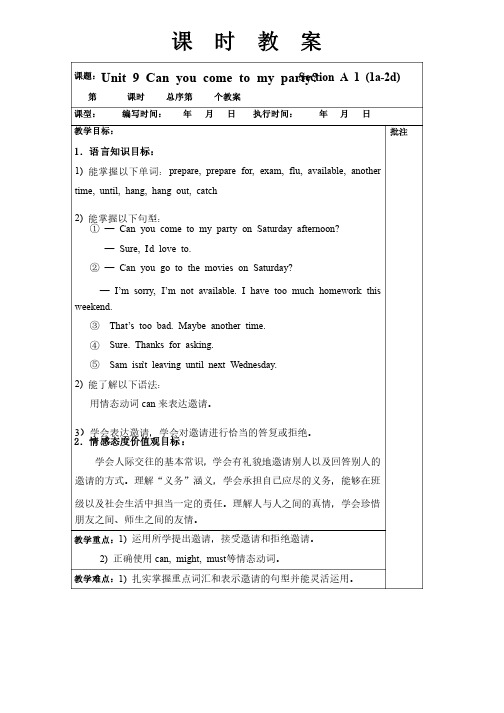
课时教案课题:Unit 9 Can you come to my party? Section A 1 (1a-2d)第课时总序第个教案课型:编写时间:年月日执行时间:年月日教学目标:1. 语言知识目标:1) 能掌握以下单词:prepare, prepare, prepare prepare prepare for, for, for, exam, exam, exam, flu, flu, flu, available, available, available, another another time, until, hang, hang out, catch 2) 能掌握以下句型:①—Can you come to my party on Saturday afternoon? —Sure, I’d love to. ②—Can you go to the movies on Saturday? —I ’m m sorry, sorry, sorry, I I ’m m not not not available. available. available. I I I have have have too too too much much much homework homework homework this this weekend. ③That That’’s too bad. Maybe another time. ④Sure. Thanks for asking. ⑤Sam isn ’t leaving until next Wednesday. 2) 能了解以下语法:用情态动词can 来表达邀请。
3)学会表达邀请,学会对邀请进行恰当的答复或拒绝。
2. 情感态度价值观目标:学会人际交往的基本常识,学会人际交往的基本常识,学会有礼貌地邀请别人以及回答别人的学会有礼貌地邀请别人以及回答别人的邀请的方式。
人教版英语八年级上册Unit9复习课优秀教学案例
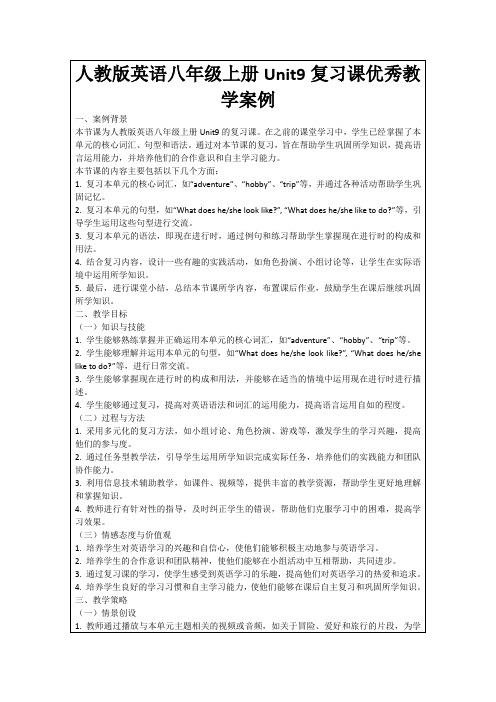
一、案例背景
本节课为人教版英语八年级上册Unit9的复习课。在之前的课堂学习中,学生已经掌握了本单元的核心词汇、句型和语法。通过对本节课的复习,旨在帮助学生巩固所学知识,提高语言运用能力,并培养他们的合作意识和自主学习能力。
Hale Waihona Puke 本节课的内容主要包括以下几个方面:
2.教师通过例句和练习,讲解现在进行时的构成和用法,如:“I am reading a book.”、“She is playing basketball.”等,帮助学生巩固现在进行时的知识。
3.教师设计一些有趣的实践活动,如角色扮演、小组讨论等,让学生在实际语境中运用所学知识,提高他们的语言运用能力。
(三)情感态度与价值观
1.培养学生对英语学习的兴趣和自信心,使他们能够积极主动地参与英语学习。
2.培养学生的合作意识和团队精神,使他们能够在小组活动中互相帮助,共同进步。
3.通过复习课的学习,使学生感受到英语学习的乐趣,提高他们对英语学习的热爱和追求。
4.培养学生良好的学习习惯和自主学习能力,使他们能够在课后自主复习和巩固所学知识。
三、教学策略
(一)情景创设
1.教师通过播放与本单元主题相关的视频或音频,如关于冒险、爱好和旅行的片段,为学生创造一个真实且生动的学习情境。
2.利用图片、图表等视觉辅助材料,展示与本单元词汇相关的事物,帮助学生更好地理解和记忆词汇。
3.设计各种真实的任务和活动,如角色扮演、小组讨论等,让学生在实际语境中运用所学知识,提高他们的语言运用能力。
(二)过程与方法
1.采用多元化的复习方法,如小组讨论、角色扮演、游戏等,激发学生的学习兴趣,提高他们的参与度。
Unit9SectionA(GrammarFocus-3c)教案人教版英语八年级上册

Unit9 SectionA(Grammar Focus3c)教学目标1.掌握重点单词、短语、句型2.情态动词might的用法3.学会有礼貌地发出、接受和拒绝对方的邀请教学难点1. New words and key phrases.2. Learn to make,accept and decline invitations politely.教学过程一、Lead inChristmas partyA: Can you e to my party on Saturday?B: Sure, I’d love to. /I'm sorry, I can't. I must/have to...Make an invitationA: Can you go hiking/...with me on Saturday?B: Sure, I’d love to.A: Great. See/Catch you on Saturday.A: What about you,xx?Can you... on Saturday?C: I'm afraid not. I'm not available/free. I must/have to...A: That's too bad. Maybe another time.C: Sure. Thanks for asking.Invitation & replyA: Can you e to/ go to…?B: Sure, I’d love to./ Sure. That sounds great.Sorry, I can’t. / I’m afraid not. / I’m not free. I have to/ must…prepare for a test go to the doctorhave a piano lesson help my parentsvisit my aunt do my homeworkA: Can he/she/they e to …?B: No, he/ she/ they can’t.He/ She/ They (might) have (has) to/ must…Grammar Focus3aplete the answers with might and one of the phrases in the box.watch TV on the weekend my cousin visit grandparentspractice the violin1. A: What are you going to do on Saturday?B: I'm not sure. I might ________________________2. A: What are you planning to do after school?B: I don't know. ______________________________3. A: When will you finish the science homework?B: __________________________________________4. A: Who are you going to the movies with?B: __________________________________________5. A: Are you free to e to my place on Saturday?B: __________________________________________3bplete the sentences below. Use the words in brackets to help you.1.Inviting:________________________ (can/play tennis)Accepting:_____________________2. Inviting: _________________________________________ (would like to/ go to the movies)Refusing: ____________________Reason: ___________________________________ (might have to)3. Inviting: _____________________________ (can/ hang out with us tonight)Refusing: ___________________Reason: _________________________(must)4. Inviting: __________________________________________ (would like to/e to my birthday party)Accepting:_____________________.2 You get these invitations but can't go. Write a refusal and areason.1. Invitation: "Can you e to my party on Saturday?"2. Invitation: "Let's go to the movies tomorrow night."3. Invitation: "Let's go to the concert on the weekend."4. Invitation: "Do you want to go shopping with me next week?"5. Invitation: "Can you play soccer with me after school today?"1. I’d like you to _________ (邀请) to dinner.2. They didn’t _________ (接受) his money.3. The girl __________ (拒绝) his invitation.4. Go straight down the street _______(直到) you see the bank.5. _________(悬挂) your clothes on the line.6.He _________(go) home until he finished his work.7. I like to ______ ______(闲逛) at mall with my friends.8. I have to run to ________ (赶) the bus.课堂练习同学们做exercisesthank you。
人教版英语八年级上册 unit9复习教案
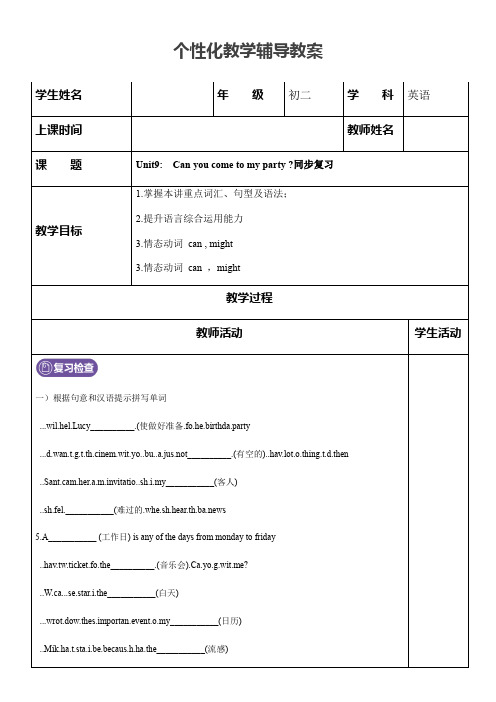
个性化教学辅导教案一)根据句意和汉语提示拼写单词...wil.hel.Lucy__________.(使做好准备.fo.he.birthda.party...d.wan.t.g.t.th.cinem.wit.yo..bu..a.jus.not__________.(有空的)..hav.lot.o.thing.t.d.then ..Sant.cam.her.a.m.invitatio..sh.i.my___________(客人)..sh.fel.___________(难过的.whe.sh.hear.th.ba.news5.A___________ (工作日) is any of the days from monday to friday..hav.tw.ticket.fo.the__________.(音乐会).Ca.yo.g.wit.me?..W.ca...se.star.i.the___________(白天)...wrot.dow.thes.importan.event.o.my___________(日历)..Mik.ha.t.sta.i.be.becaus.h.ha.the___________(流感)...Th.easter.sta.shi.acciden.i.th.biggest___________(事件.o.Chin.i. (5)二、根据句意及要求使句子补充完整Th.part.start.a.6:3.pm.(对画线部分提问)________ ________ the party start?2.Ou.scienc.teache.i.talkin.wit.he.son.(对画线部分提问)________ ________ our science teacher ________ with?3.Toda.i.Frida.th.22nd.(对画线部分提问.._______.today?4.Peopl.i.tha.tow.hav.t.move(搬家.t..ne.place.(改为一般疑问句)_______ people in that town _______ _______ move to a new place?5.The.ca.g.t.th.beac.thi.weeken..(变为一般疑问句并作否定回答._______ _________ go to the beach this weekend? ______, they _________.Part1知识点精析1()ually, we don’t know how important something is ______ we lost it.A.o.......B.unti......C.a.soo.a.D.instead【语境激活】Oh.bu.Sa.isn’.leavin.unti.nex.Wednesday.1)【解析】until直到….为...重要结构.not...unti..直到......才......2)肯定形式表示的意思是"做某事直至某时", 动词必须是延续性的。
- 1、下载文档前请自行甄别文档内容的完整性,平台不提供额外的编辑、内容补充、找答案等附加服务。
- 2、"仅部分预览"的文档,不可在线预览部分如存在完整性等问题,可反馈申请退款(可完整预览的文档不适用该条件!)。
- 3、如文档侵犯您的权益,请联系客服反馈,我们会尽快为您处理(人工客服工作时间:9:00-18:30)。
个性化教学辅导教案一)根据句意和汉语提示拼写单词1 . I will helpLucy___________ (使做好准备)for her birthday party2 . I do want to go to the cinema withyou,but i am just not___________ (有空的). i have lots of thingstodo then3. Santa camehere atmyinvitation. sheis my___________(客人)4. shefelt ___________(难过的)whenshe heard the bad news5.A___________(工作日) is any of the daysfrommondayto friday6 I have two tickets for the___________(音乐会).Can yougowith me?7. We can' t see starsin the___________(白天)8 . I wrote down theseimportant eventsonmy___________(日历)9 . Mike had tostay in bedbecause he had the___________(流感)1 0 .Theeastern star ship accident isthebiggest___________(事件) of Chin ain2015二、根据句意及要求使句子补充完整1.The party startsat 6:30pm.(对画线部分提问)________ ________ thepartystart?2. Our scienceteacheris talking with her son. (对画线部分提问)________ ________ our scienceteacher________with?3.Today is Friday the 22nd. (对画线部分提问)________today?4. People in that town have to move(搬家) to anew place.(改为一般疑问句)_______ people in that town _______ _______ moveto a new place?5.They cango to the beachthis weekend .(变为一般疑问句并作否定回答)_______ _________ goto the beach this weekend?______,they_________.Part1知识点精析1( )1.Usually, we don’t know how important something is______ we lost it.A.or B.until ﻩC. as soon asD. instead【语境激活】Oh, butSam isn’t leaving untilnextWednesday.【解析】until直到….为止重要结构:not...until: 直到......才......1)肯定形式表示的意思是"做某事直至某时",动词必须是延续性的。
2)否定形式not…until表达的意思是"直至某时才做某事",强调动作直到until 后的时间才发生。
动词为延续性或非延续性都可以,not 通常与首句中的be动词、助动词或情态动词连用。
e.g.Theleft-behind kids(留守儿童)can’tseetheir parents untilthe parents comeback home fromwork.()1.She _______ go to bed _________ she finishedherhomework.doesn’t; until B.didn’t; until C. won’t; until D. can’t; until翻译:直到下个月Tom才离开_____________________________________2( ) 1.We all look forward to _______to university to learn more.A.goB. goingC. went ﻩD. gone( ) 2. I used to writeto Peter everyweek.But I haven’t heard _______h imfor a longtime.A.ofﻩB.to C.onﻩD.from【语境激活】I lookforward tohearing fromyou all.【解析1】look forward to意为“盼望,期待”,to为介词,后接名词或动名词,其结构为:lookforward tosth/doingsth.【解析2】hear from意为“收到……的来信”,相当于get/receive a letter fromsb. 【辨析】lookforward to和expectlookforwardto期待,指带着愉快的心情期待着某事的发生。
The students are looking forward to theirholiday.学生们盼望着假期的来临。
expect期待,指确信某事必将发生,多用于好的事物,也可用于不好的事物。
I didn't expect to meet you here.我没有预料到会在这儿遇到你。
I lookforward to hearing from youall.我期待收到你们所有人的回复。
【拓展】lookafter hissister【解析】look after意为:照顾,照料,相当于:take careof( ) 1. Myfamily andI______looking forward to______my grandparents. A.am; visit B. are; visit C. am; visiting D. are;visiting( )2.-Have you heard _______ YOG?-Yes.Itis the Youth Olympic Games. (青奥会)ﻩA.of B. to C.on D. from重点解析2)物做主语时,指物“可用的;有效的”词条词性中文释义备注例句available adj.有空的(free)不修饰名词Will she be available today?可获得的修饰名词This is the only room available.5.invite v.邀请【解析】n. invitation【拓展】invitesb. todo sth. 邀请某人做某事invite sb.to sp. 邀请某人去某地an invitation to... ......的邀请函make an invitation 提出/发出邀请accept an invitation 接受邀请refuseaninvitation 拒绝邀请6.acceptv.接受,领受,承认,认可,同意【词义辨析】accept & receiveaccept是主观上的接受,receive是客观上收到。
e.g.I received hergift but didn’taccept it.1.—I can’t find David. Where is he?—He __________for tomorrow’s competitions athome.A.prepares B.is preparingﻩC.has prepared D. prepared2.I _____ a letterfrom myparents last weekend.I must answeritnow.A. reachedB.accepted C.receivedﻩD. touched3.— Hello!Golden SunHotel.Can I helpyou?reply指经过思考或有针对性的回答replay to +名词/代词reply that+从句answer a.指一般的回答问题b.接听(电话)或对门铃等声响作出反应answer后直接跟名词10.BringMs.Steen to the party without telling hersothat she canbe surprised.【解析1】without prep.没有;不;→反义词with;用法:without+ 名词/代词/动名词【解析2】so that “以便;目的是” = in order that…1)用来引导目的状语从句,从句中谓语动词用may, can, should等情态动词。
e.g. Hegot upvery earlyso thathe couldcatchthe train . (目的状语从句)2)引导结果状语从句时,没有一般没有情态动词,从句与主句之间往往有逗号隔开。
e.g. He worked hard athis lessons,so thathe gained high grades in theexams.(结果状语从句)【解析3】surprised adj. 吃惊的→surprise v.使吃惊→surprisingadj. 令人吃惊的【拓展】be surprised to dosth.be surprised at sth.be surprisedthat...to one’s surprise insurprise【跟踪训练】1.— The World Cup is coming. I won’t _______ anygame!—I’m looking forwardto_______every matchof it,too.A.miss;to watchﻩB.miss; watchingﻩC. to miss; watchﻩD. to mis s; watched2.The teacher speaks veryloudly____all the students canhear her.A.so thatﻩB.because C. since ﻩD.when 3.Thestudents ______ but didn’t______ my question.A. answered; reply B.replied; answer C. answered;repliedD.reply; answer4.Ithinkyou can be_______at the______news.A. surprised; surprised B. surprising; surprising C. surprised; surprising D. surprising; surprised5.The boy refused __________(go)toseehisfather with us.3() 1.There are 2 coats.One isfor me, _______ isfor my brother.A.another ﻩB.theother C.others ﻩD. other( )2.Theskirt is toobig for me, could youplease showme_______one?A.another ﻩB.the other C.othersﻩD. Other【辨析】another,other,the other,others与theothersanother指不定数目中的“另一个;又一个”,用来代替或修饰单数可数名词。
